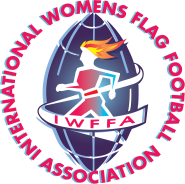

REGISTER HERE
FOR FREE IWFFA FLAG FOOTBALL CLINIC
The IWFFA proudly presents educational clinics for players, coaches, and officials.
Upcoming clinics to be announced soon!
The IWFFA Clinics can help to:
- Teach how to play flag football
- Start a flag football team
- Start a flag football league
- Support your existing team
- Support your existing league
- Teach how to coach flag football
- Teach how to officiate flag football
Developing Leaders One at a Time
What sets the International Women’s Flag Football Association (IWFFA), apart from many other sports organizations is that we aim to develop leaders, aside from just forming a team, playing a game and trying to win the championship.
The goals of the IWFFA
Are to develop female leaders and we use the sport of flag football as a vehicle to do this. Thus, our flag football clinics are structured differently than other sports clinics
There are different ways to educate and learn
Lecturing and demonstration are common practices which can be successful in clinics and coaching to bring the athlete to a certain level of understanding the sport. When you listen as in a lecture, or instructions given on the field – you learn by memorization. When you practice what you have heard or seen – you learn by doing.
The IWFFA takes our clinics to another level
To create a well-rounded athlete who not only understands the rules of the game, the importance, the responsibilities and goals of one’s position on the field, but guides the athlete to problem solving on the field during competition where a challenge arises that a coach has not previously described, and a decision must be made solely by the player in an instant.
We challenge our athletes
Physically and mentally, using traditional learning methods. We also incorporate: Questions & Answers & Problem Solving, following instruction on the field. We take our players into a group setting to discuss what they have learned, what challenges they faced and how they would solve the problem.
Thinking, learning to understand a challenge on the field
And discovering a solution on one’s own, will create better athletes on the field who can then meet other challenges unknown and be successful to overcome those challenges.
When a player on the field meets a challenge
By applying higher-order of thinking skills, the player can use their mental pathways to: first identify and understand what the problem is, how to overcome and solve the problem and then to take action. Learning these skills will show the athlete how to control their own game, learn more about themselves and the sport, and be successful compared to playing an emotional game which may cause an athlete to loose control, become angry, or begin to play dirty.
These techniques are life skills
Which can be used in other areas of one’s life, off the field and onto the work, school or other social environments.
